
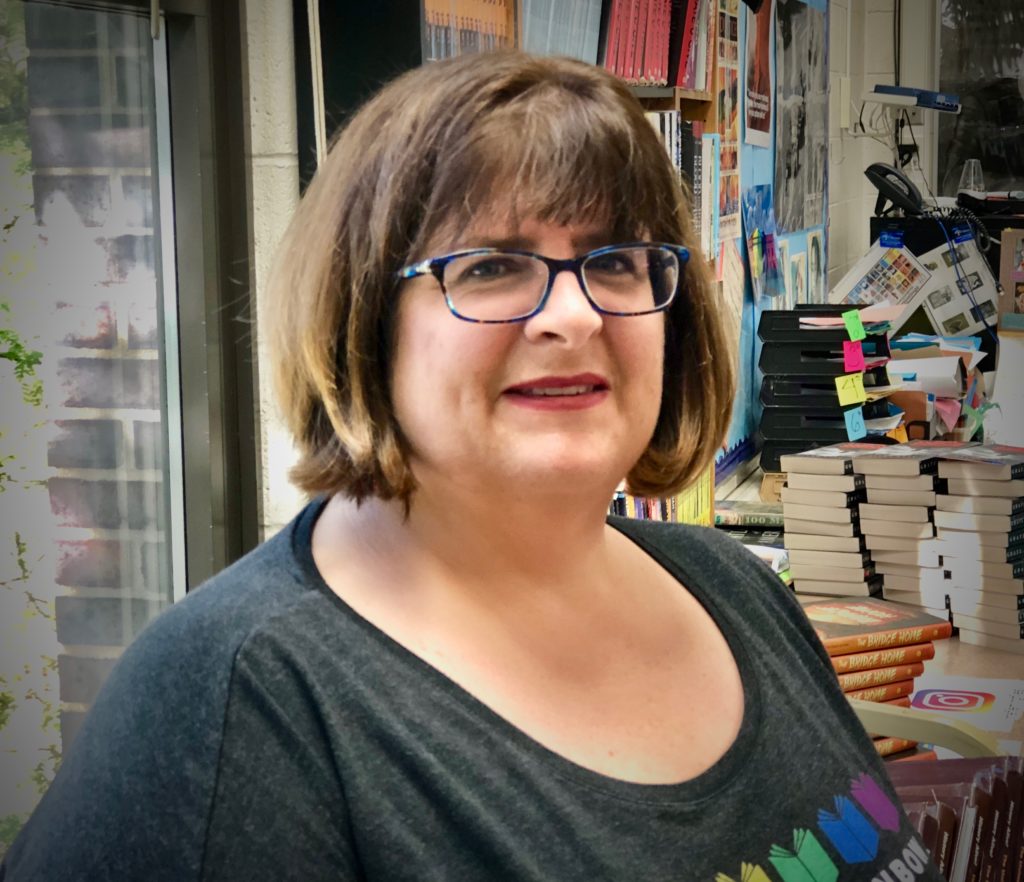
By Jo Mathis/AAPS District News Editor
Jessica Fleming was born in Silver Springs, Maryland and lived in metro Washington, D.C. until she was 14. New jobs brought her family to the Ann Arbor area for high school. Even after her parents left for jobs in Colorado, Fleming stayed to finish college at the University of Michigan and marry Matt Fleming, her college sweetheart. Together they started a family in suburban Ypsilanti. Their daughter Leah, a Community High School graduate, is now a part of the Women in Science and Engineering residence program at U-M, and their son Samuel is a sophomore at Huron who keeps busy playing euphonium and rowing for crew. She is also an excited dog mom to Arya, a five-year-old chocolate lab.
Fleming can be found resale shopping most weekends in order to fill her Little Free Library she keeps in her classroom. During the summer, her Little Free Library goes on the road with her and her family in their camper.
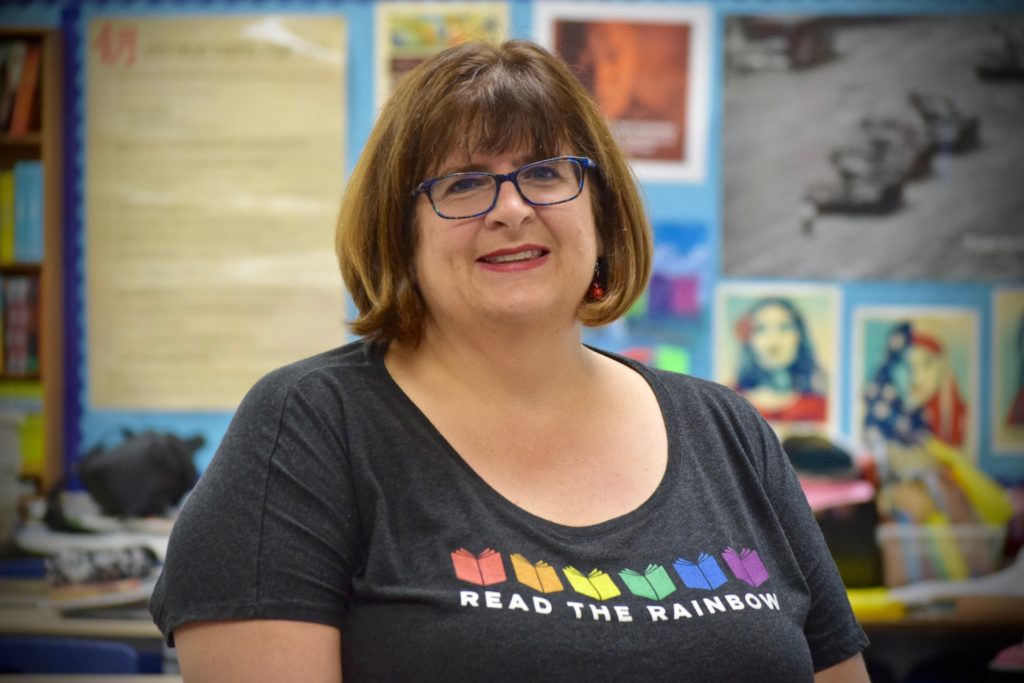
When and why did you decide to use literature to teach social studies? What does that look like?
I’ve always been a big reader and have used books to help me understand the world, especially the places and times I am unfamiliar with, so it seemed natural to me to do that for my students, as well. From the beginning, I would read about places and people we were studying in class and tell my students these stories.
The next step was adding the texts themselves to the curriculum whenever possible. The students really responded to learning about other kids their age in different places and times. Then they can make connections to their own lives. It amazed me how much more we all got from the curriculum itself by experiencing it through the life of someone else.
Most recently, we read a book each quarter in my seventh grade classes on topics related to gender equity, conflict, refugees, poverty, and history. In my eighth grade classes, we read novels based on a young Native American boy, an enslaved girl, and a young Civil War soldier, all of which fit great into the curriculum. We also do occasional ‘book looks’ in the library. For example, I’ll get Clague librarian Kim McLean to pull around 50 books on an area or topic related to our studies so students can choose what to learn about and connect it to our lessons.
We are also in our second year for The Global Read Aloud. This fantastic program helps connect classrooms reading the same book. Last year we sent handmade postcards to classrooms in the US, Canada, and India all reading “Refugee” by Alan Gratz. I hope to make more connections with classrooms both nationally and with a few outside the US this year reading “The Bridge Home” by Padma Venkatraman. We are in a postcard exchange with 40 other groups.
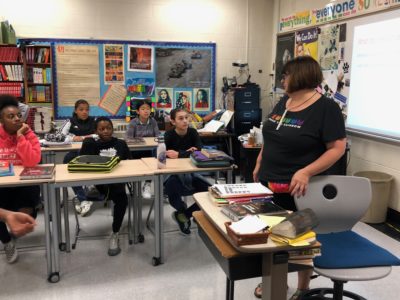
How do you get your students to be as excited about social justice as you are?
I’m not sure they are, because, you know, puberty. It is totally developmentally appropriate for them to be really concerned about themselves. I figure if I am constantly coming at them with another article, another connection, another story something will slip in that gets them thinking and helps them build empathy.
Even students not in my classes or after school social justice book club, Cougars Care, can borrow from my growing library of books. Our first Cougars Care book, “Ghost Boys” by Jewell Parker Rhodes lead to discussions about The Civil Rights Movement and then the reading of “The March Series by Rep. John Lewis.”
What’s the best compliment anyone could give you?
“Can I borrow this book?” Or maybe: “You told me to read X and it was spectacular.” Better yet: “Here’s a book off of your Amazon wish list.”
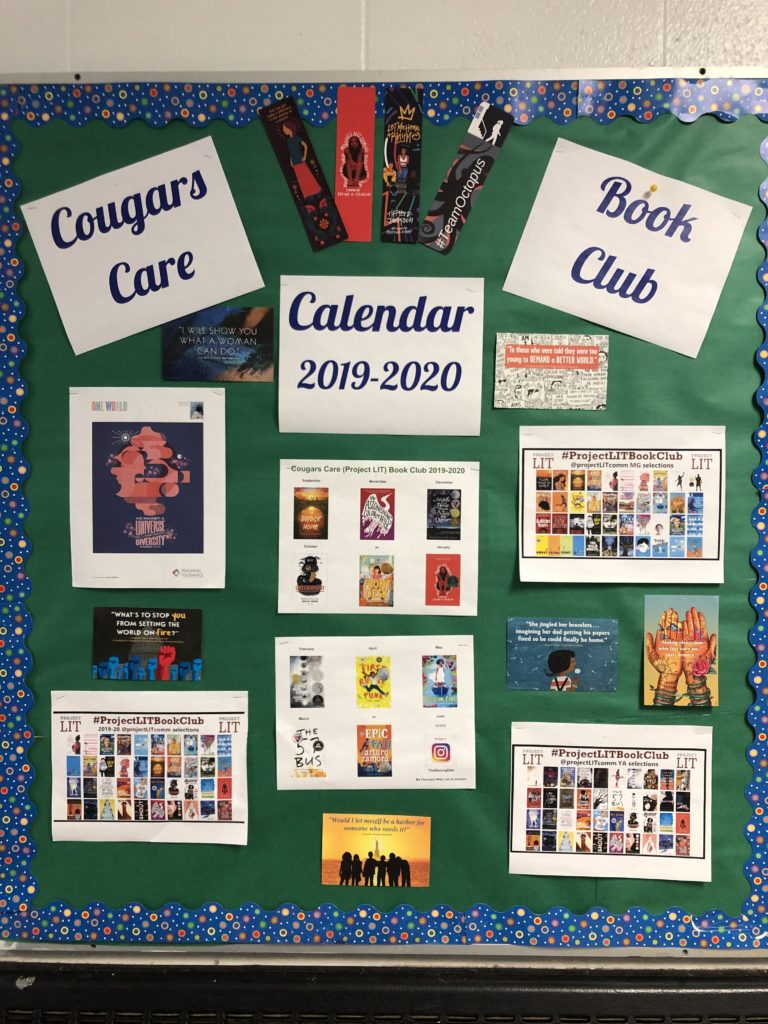
In your 20 years in AAPS, what’s the most important thing you’ve learned about teaching? About learning?
I’ve been at Clague since 1999, in the same room with just a little subbing around the district before then. After my 15th year of teaching, I found that I needed a new spark. Through the WISD, I found Justice Leaders. The things I learned there helped me find The Project LIT Community which in turn lead to my current after-school social justice book club: Cougars Care. All of this required stretching myself to meet more community members looking for book donations, service projects, and events to support the program.
To make a long story short, even teachers may have a ‘growth spurt’ in their career’s teenage years.
Favorite websites:
AADL to check on my library holds, and too many news sites to list.
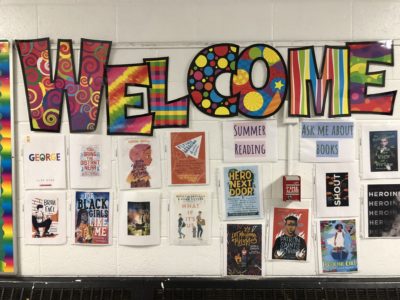
Apps you can’t live without:
Instagram (theflemingfiles), where I report on books I’ve read and authors I’ve met.
Twitter to keep in contact with many of these authors. The Project LIT Community is very active on Twitter and has helped me to find book events and hear what these amazing authors are doing. They are so responsive and thrilled to hear about students reading their books.
What was always written on your report card in grade school?
“Talks too much.”
What were you like in middle school?
“My mom says ‘terrible’ and that’s why I am stuck there as an adult. Even my own children ask at least once a week: ‘What are you, 12?’
What do you know about teaching now that you wish you’d known that first year?
That students learn so much more from someone who likes them and knows who they are. Also, the ‘planned to the last second lesson’ is not as important as the students’ interest in the topic.
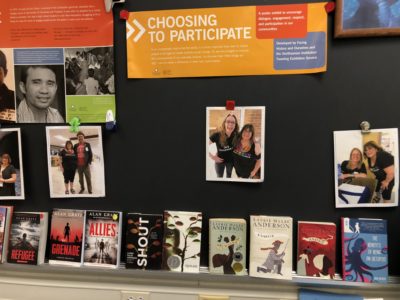
How do you keep students engaged?
I hope by always keeping my information up to date. I take a lot of time to make sure I am keeping up on the news through numerous sources – printed and online. I also read what my students are reading. Most of all, I love it when I am grading papers and see that they have written down titles I’ve mentioned in the margins.
How do you show school spirit?
I have spirit wear for every day of the week and then some. Both my children were Clague Cougars as well, so I’ve been to many fun nights, concerts, sporting events, and field trips as both mom and teacher.
What do you wish everyone realized about the work of a teacher?
That is it never-ending. We are always doing research into a new idea, trying to dig up funding for a project, and refiguring what we already do to make it better.
How do you recharge?
Knitting and listening to books on tape. Resale shopping also helps me find joy as I find amazing books at really low costs to support my classroom library.
How do you spend your summers?
I’m so glad you asked! My family travels by camper in the summer. Summer 2018 was a loop around the American west, including the Badlands, and the Redwood and Olympic National Parks. Summer 2019 was five weeks and four Canadian provinces – New Brunswick, Prince Edward Island, Nova Scotia, and Newfoundland. Next summer we are looking to go to the Canadian Rockies.
What’s most exciting about your professional life right now? Your personal life?
Professionally I’ve been presenting my use of books to teach social studies and social justice in front of peers at the local, district, and state levels. This will be continued with a poster presentation at a national conference this fall and (fingers crossed) another state-level conference in the spring. In my personal life, it is great to see my kids growing up and handling more and more of their needs themselves.
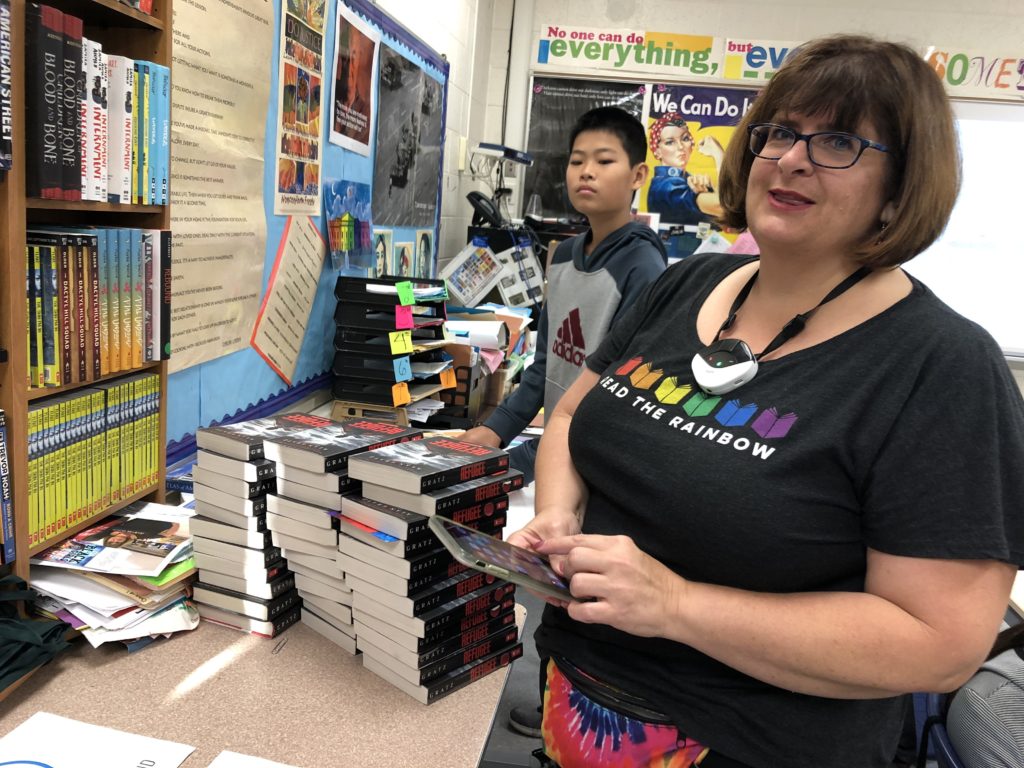

Be the first to comment